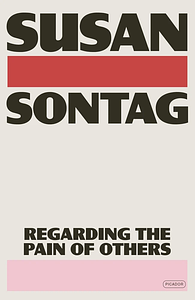You need to sign in or sign up before continuing.
Take a photo of a barcode or cover
Must read. Everything Sontag talks about, photographing and televising war, is manifold with the current social media and internet news-ification. Sontag explores how war photography shapes the understanding of those who haven't experienced war. The copy I read already had tons of underlines and highlights, and ngl, it has sooo many quote-worthy sentences, but:
"'We'—this 'we' is everyone who has never experienced anything like what they went through—don't understand. We don't get it. We truly can't imagine what it was like. We can't imagine how dreadful, how terrifying war is; and how normal it becomes. Can't understand, can't imagine. That's what every soldier, and every journalist and aid worker and independent observer who has put in time under fire, and had the luck to elude the death that struck down others nearby, stubbornly feels. And they are right."
"'We'—this 'we' is everyone who has never experienced anything like what they went through—don't understand. We don't get it. We truly can't imagine what it was like. We can't imagine how dreadful, how terrifying war is; and how normal it becomes. Can't understand, can't imagine. That's what every soldier, and every journalist and aid worker and independent observer who has put in time under fire, and had the luck to elude the death that struck down others nearby, stubbornly feels. And they are right."
dark
emotional
inspiring
reflective
I don't think Sontag has ever written a single uninteresting paragraph. I've only read a few of her works, but basically, in each text she invites you to look deeper, more critically, and not to take for granted what should be examined closely. She's one of those rare authors of whom I want to read absolutely everything she's ever written.
dark
emotional
informative
reflective
sad
medium-paced
Got this recommended by my dad after we’d been to see an exhibition of Goya’s «The Disasters of War» a couple of months ago. Sharply presented analysis, thought-provoking and confronting claims, and interestingly a topic which has only escalated in relevance since the release of this essay 20 years ago.
In this short book, revisiting ideas presented in her classic On Photography, Susan Sontag offers a thought-provoking assessment of the way we document atrocities. Surveying the evolution of war photography, Sontag takes us from the cannonball-riddled fields of the Crimean War to the concentration camps of the Holocaust, from Vietnam and Cambodia to the ruins of Ground Zero. She describes how public expectations for photography have changed over time: the old practice of staging photographs, for example, is now seen as inauthentic. Staged photos have been superseded by the candid image, which is considered more objective. Sontag also revises her previous theory, from On Photography, that images lose their power and become “less real” after repeated exposure. She challenges the popular argument of Debord and Baudrillard that reality is spectacle, calling this a “breathtaking provincialism” that reflects the view of a rich elite. The book is full of insightful observations extending well beyond the field of photography. If you are interested in understanding how images shape our view of the world, check out Regarding the Pain of Others. – Anthony C.
She makes some interesting points about the role photography plays in garnering support for victims of war violence. It wasn't earth-shattering, but it was worth my time.
challenging
dark
informative
reflective
medium-paced
informative
reflective
fast-paced




